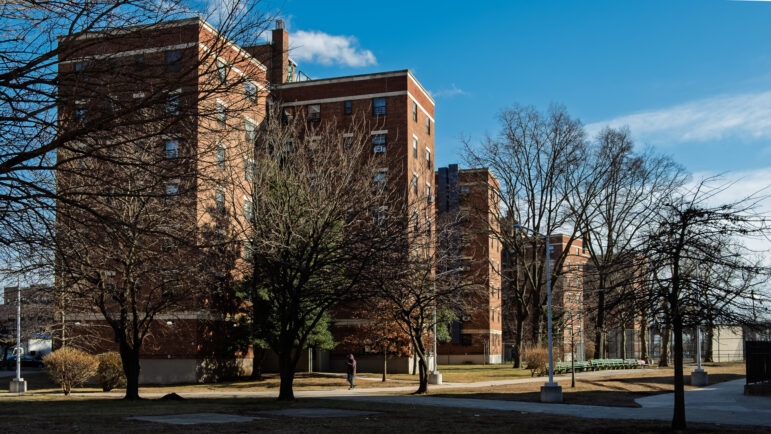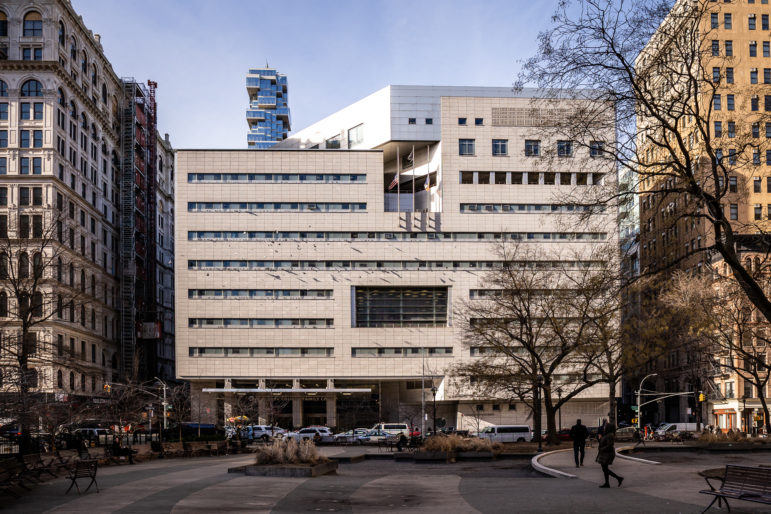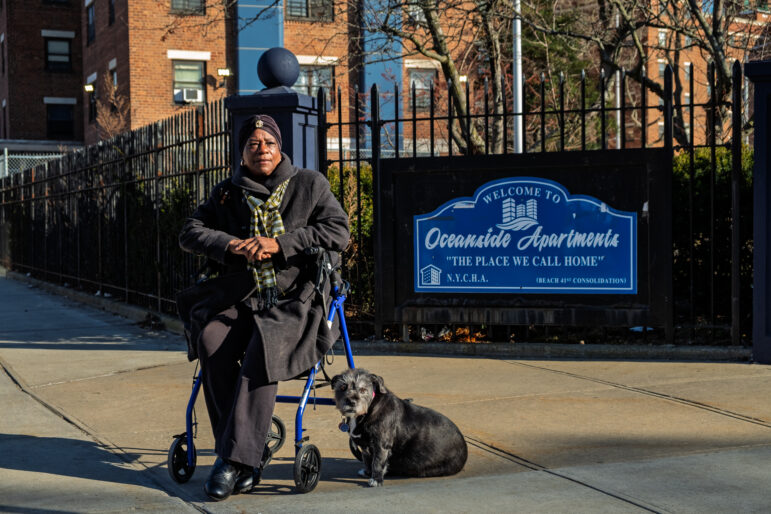After three attempts to get permits for its pipeline project failed, Williams Companies Inc claims it’s walking away. But as other companies seek to expand fracked gas infrastructure in New York, activists say the fight feels far from over.
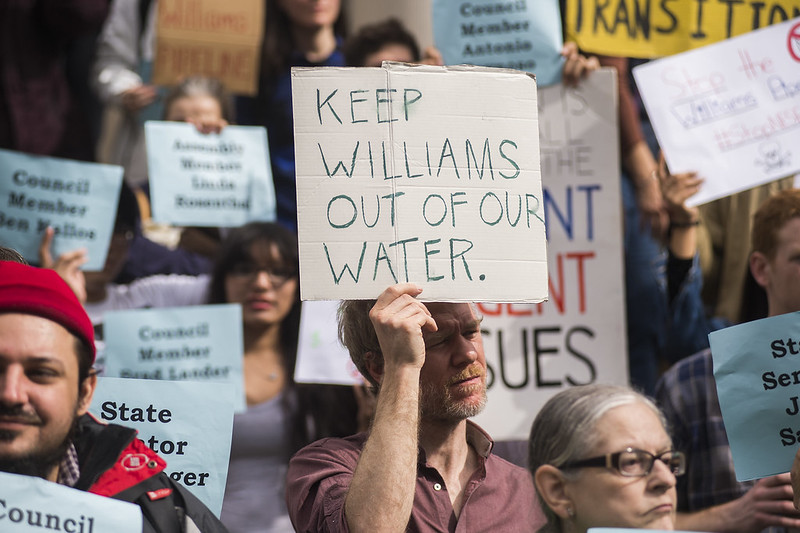
Jeff Reed/NYC Council
A rally against the proposed Williams pipeline on the steps of City Hall in March 2019.Since 2017, environmental activists have been battling attempts to build the Williams Pipeline, a gas infrastructure project that would start in Pennsylvania, make its way through New Jersey and end in New York City’s Rockaways.
Now, the company claims the saga has finally come to an end. Williams Companies Inc, the entity responsible for the proposal, notified state authorities last month that it would let a 2019 federal permit that green-lit the project expire on May 3, and would not be seeking an extension.
And despite celebrating the decision as a victory, activists say the fight to end the expansion of fracked gas infrastructure across the state continues.
“The Williams pipeline may have been defeated. But the fight has shifted,” said Sara Gronim from the environmental non-profit 350 Brooklyn, which vehemently opposed the expansion over the years. “There are other forces in the natural gas industry in New York that have not yet recognized that New York State is moving off gas.”
Since 2019, when New York passed its landmark climate law that requires the state to mostly phase out fossil fuels like gas by 2050, utility companies have spent nearly $5 billion to maintain and expand gas infrastructure across the region, according to the Building Decarbonization Coalition.
The latest fossil-fueled project to mobilize local environmental groups is the proposed enhancement of the 30-year-old fracked gas Iroquois pipeline, which runs from Canada to New York City.
The venture, carried out by the Iroquois Pipeline Operating Company, aims to boost capacity by enhancing four compressor stations to increase the flow of gas to New York City by November 2025. It seeks to add a total of 125 million cubic feet per day of natural gas to its existing infrastructure, to be distributed by utilities like National Grid and Con Edison.
And with the industry pushing hard to keep gas flowing, activists say there’s also no guarantee that Williams won’t reapply for an expansion in the future.
“For now, they have admitted defeat with this particular project. But if they see another opportunity in the northeast they could come back,” Gronim said.
Three tries, three denials
Gronim has reason to worry, if precedent is any indication: in the past, Williams kept reapplying for permits even after they were denied.
For years, Williams pushed for the new pipeline, claiming it was necessary to meet projected peak demand levels for gas. But environmental groups say the proposed expansion, which would include adding approximately 23.5 miles of underwater pipeline from New Jersey to Rockaway, would be harmful for the environment, churning up arsenic, lead, and other contaminants from the sea floor.
Under a federal law known as the Clean Water Act, gas companies are required to seek out a state water-quality permit to lay down pipelines. In New York, the regulatory body responsible for sifting through these applications is the Department of Environmental Conservation (DEC).
When Transco, the Williams’ subsidiary in charge of the project, applied for a water-quality permit for the first time in 2017, it was denied. The company resubmitted its plan a year later only to have it refused again. Despite the denials, it didn’t give up: a third attempt was made in 2019, but that too was shot down.

FERC
The route of the proposed Williams pipeline.On the national level, Williams was granted permission for the project from the Federal Energy Regulatory Commission (FERC), the agency tasked with regulating the interstate transmission of gas in the U.S. But that expired earlier this month.
In an email a spokesperson for Williams reiterated that they “have decided not to pursue an extension of the [FERC] certificate.”
“Natural gas remains a critical part of our country’s energy mix, necessary to ensure reliability for more intermittent resources during periods of peak demand and to progress our nation’s climate goals,” the spokesperson added.
All eyes on Iroquois
Williams’ move to walk away from the federal extension is being viewed as a victory by the environmental community, which has already moved on to the next big pipeline fight.
Now, they are hoping to stop the Iroquois Pipeline Company from enhancing two New York based compressor stations along its route, which runs from Wadington on the border with Canada all the way to Dover near Connecticut .
In a brochure issued by the company, they cite a need to “meet the increasing need for natural gas in the northeast region” as a main driver behind the project.
The company applied for two air permits in late 2022 and is awaiting approval from the DEC. The decision is due any day now.
In this case, they didn’t need to apply for a water-quality certificate because they aren’t laying down new pipes. Instead, they have to justify the chemicals and pollutants that the project will release into New York’s air.
Fracked gas releases greenhouse gasses that bring about climate change, including a potent pollutant known as methane. U.S. natural gas pipelines are leaking between 1.2 million and 2.6 million tons of methane per year, according to a report by the Environmental Defense Fund.
In the project’s brochure the company highlights that it “will be subject to an extensive environmental review as part of the regulatory process” and will seek to reduce “overall emissions at project sites,” through the use of specialized turbines and methane recovery systems.
“We are dedicated to preserving our environment by seeking ways to minimize intrusions to, and maximize protection of, our natural resources,” the company’s brochure said.
The regulatory agency that governs utility companies, the New York State Department of Public Service (NYS DPS), issued a statement in February backing the company’s effort. The agency claims the expansion “is necessary to ensure Con Edison’s and National Grid’s continued provision of safe, adequate, and reliable gas service to customers in the downstate region.”
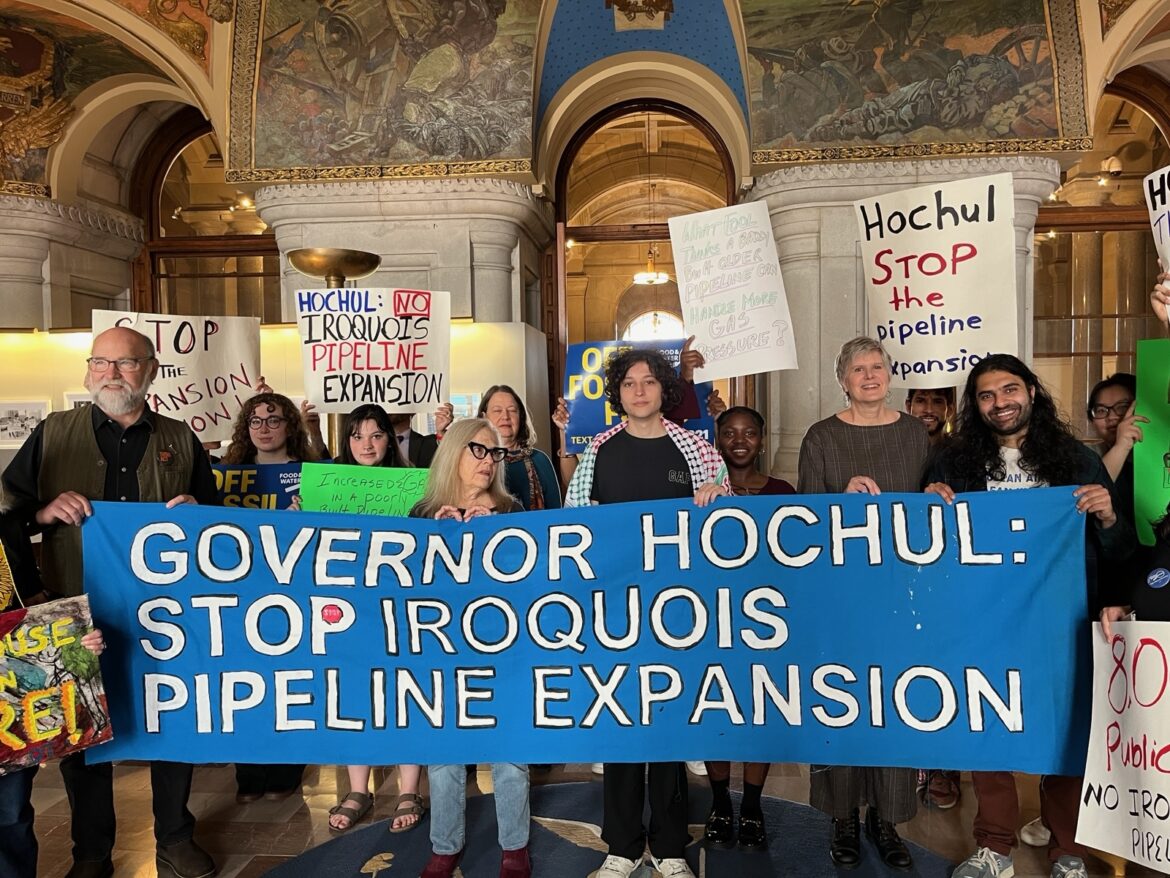
Food & Water Watch
Environmental groups rallying in Albany last week, pressing the governor to oppose the Iroquois pipeline expansion.“The focus must continue to be on the legitimate energy needs of the state,” a spokesperson for the Iroquois Pipeline Company said in an email, echoing the DPS’ statement.”This project is essential for Con Edison and National Grid to continue to reliably serve their New York customers during the transition to cleaner energy sources.”
The public was given a chance to weigh in during the permit approval process, too. Residents who live in Athens and Dover, NY, where the compressor stations are located, expressed concerns over health risks associated with pushing more gas through the pipeline.
“Compressor stations are semi-permanent facilities that pollute the air 24 hours a day as long as gas is flowing through pipelines,” the Concerned Health Professionals of New York pointed out in the comments they submitted to the DEC. These pollutants, they argued, “are known contributors to preterm birth, childhood asthma, heart disease, stroke, respiratory distress, and shorter lifespan.”
According to environmental nonprofit Food & Water Watch, compressor stations also emit cancer-causing chemicals like nitrogen oxide (NOx), fine particulate matter, carbon monoxide, benzene, and formaldehyde. A 2019 study found that air emissions from 74 compressor stations in New York State contained 39 chemicals known to be human carcinogens.
“The air is already terrible in Athens. Who knows what kind of repercussions we might see to our health,” said Mary Finneran, a retired high school teacher who lives in a neighboring community and says she drives by the compressor stations often. The Iroquois pipeline also passes less than a quarter mile away from an elementary school.
“We have to fight for the well-being of our kids,” Finneran added.
The former teacher joined environmental groups Wednesday on a quest to personally deliver the comments they submitted to the DEC to Gov. Kathy Hochul. They’re urging the administration to ensure the Iroqouis’ proposal for expansion meets the same fate that the Williams project did.
“We saw with the Williams pipeline that the gas was not wanted. But now the fossil fuel industry is again pushing for a new project,” said Emily Skydel, a senior organizer at Food & Water Watch.
“I think they are throwing darts at the board to see what sticks. So they’ll do whatever they can to get a project approved.”
To reach the reporter behind this story, contact Mariana@citylimits.org. To reach the editor, contact Jeanmarie@citylimits.org
Want to republish this story? Find City Limits’ reprint policy here.




